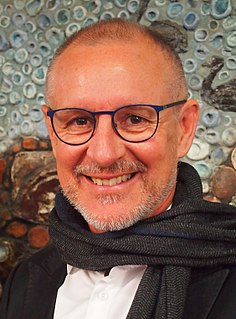A Quote by John Perry Barlow
I come from Cyberspace, the new home of Mind. On behalf of the future, I ask you of the past to leave us alone. You are not welcome among us. You have no sovereignty where we gather.
Related Quotes
Keep in mind how fast things pass by and are gone - those that are now, and those to come. Existence flows past us like a river; the "what" is in constant flux, the "why" has a thousand variations. Nothing is stable, not even what's right here. The infinity of past and future gapes before us - a chasm whose depths we cannot see.
People are always shouting they want to create a better future. It's not true. The future is an apathetic void of no interest to anyone. The past is full of life, eager to irritate us, provoke and insult us, tempt us to destroy or repaint it. The only reason people want to be masters of the future is to change the past.
Take cyberspace as an example. We had this wonderful utopian vision of a new home for the mind. What we've reaped isn't cyberspace. It's cyberbia. It's this vast, bland wasteland of vulgar people and trivial ideas and pictures of half-naked starlets. But despite all the uncertainty, has there ever been a more fascinating moment to be alive?
Today, we're taking a break from the concerns and the bustle of the work-a-day world. But we're also making a new beginning. As we gather around our dining room tables for the midday meal, let us thank God for life and the blessings He's put before us. High among them are our families, our freedom, and the opportunities of a new year.
While optimism makes us live as if someday soon things will soon go better for us, hope frees us from the need to predict the future and allows us to live in the present, with the deep trust that God will never leave us alone but will fulfill the deepest desires of our heart... Joy in this perspective is the fruit of hope.
Life is the future, not the past. The past can teach us, through experience, how to accomplish things in the future, comfort us with cherished memories, and provide the foundation of what has already been accomplished. But only the future holds life. To live in the past is to embrace what is dead. To live life to its fullest, each day must be created anew.
We do not look for reason for logic in the passionate entreaties of those who are sick unto death; we are stung with the recollection of a thousand slighted opportunities of fulfilling the wishes of those who will soon pass away from among us: and do they ask us for the future happiness of our lives, we lay it at their feet, and will it away from us.






































